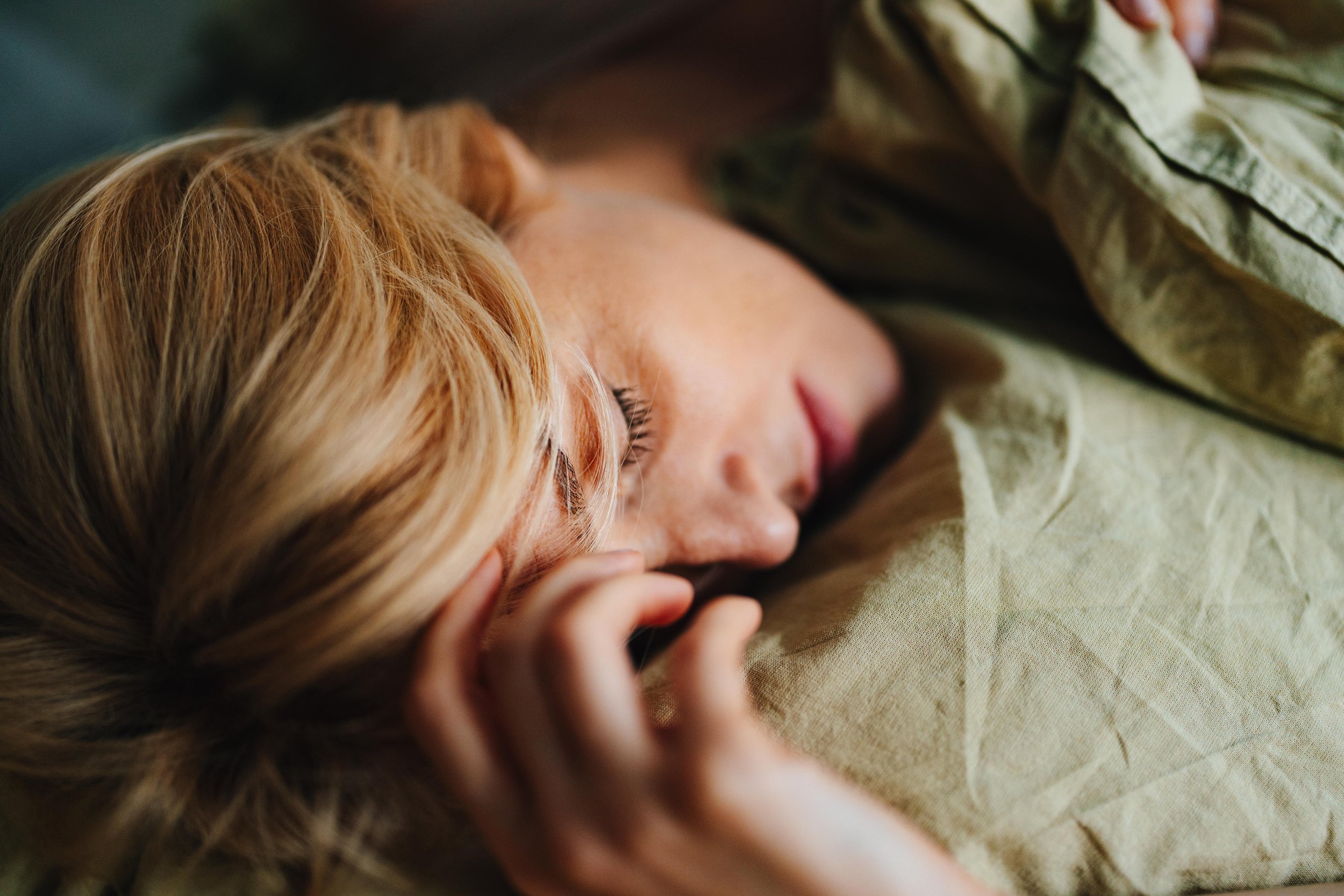Causes of insomnia in females & 9 tips to manage sleeplessness
Women are more likely to suffer from insomnia than men. Learn the causes of insomnia in females, plus 9 tips for women to manage insomnia and get better sleep.
Struggling to get a good night’s sleep is an experience many women find all too familiar. Far more people born female suffer from chronic sleep trouble, also known as insomnia, than people born male. And middle-aged women suffer the most of all, according to an international study commissioned by Calm.
Insomnia is not just an annoyance but a significant health concern that can disrupt a woman’s quality of life. Understanding the causes of insomnia in females is the first step toward managing this sleep disorder.
Insomnia in women
Women are 40% more likely than men to sleep poorly, revealed a survey of 4,279 Britons and Americans conducted by polling company YouGov on behalf of Calm. This figure rises to its peak in middle-aged women, with 55% of women reporting sleeping poorly more often than getting quality sleep. Middle-age is also when the gender gap is greatest between women sleeping worse than men.
“I certainly see more women with sleep trouble than men,” says Dr. Steve Orma, PhD.
Dr. Orma is a clinical psychologist, insomnia specialist, and author of the book Stop Worrying and Go To Sleep. He seeks to clarify the unique aspects of insomnia in women as a first step in helping those who suffer to find solutions. By knowing what causes insomnia in females, we can better address these issues so women can work toward getting better sleep.
💙 Struggling to get to sleep? Listening to a sleep story, like Dr. Orma’s Sleep Science, can help you wind down in the evening.
Not just hormones: 4 causes of insomnia in females
There are several reasons why women might find it hard to get a good night's sleep, like potential biological factors that can cause insomnia. Once you’re able to identify what’s keeping you awake, you can address those issues directly.
1. Hormonal insomnia
“One is hormones—such as estrogen and progesterone—which fluctuate more in women,” says Dr. Orma. For women, these hormonal changes are often dramatic and frequent. This is particularly marked at times when a woman's body goes through big hormonal shifts, and these can directly impact how well she sleeps.
Menstrual cycle: Changes in hormone levels during the menstrual cycle can significantly impact sleep patterns, often leading to disturbances in sleep quality for many women.
Gender transition: Hormonal changes, particularly those induced by hormone therapy, may affect sleep patterns. This can sometimes lead to issues like insomnia or altered sleep cycles.
Pregnancy: Finding a comfortable sleeping position in pregnancy can be difficult. “Pregnancy involves a lot of discomfort,” says Dr. Orma. “You have an increased need to urinate. It can also cause breathing difficulties during sleep, such as sleep apnea (where you temporarily stop breathing).” Plus, the anticipation and anxiety about becoming a new parent can play a role in causing sleepless nights.
Menopause: “People in general start sleeping worse when they get older, and sleep becomes lighter, particularly in the latter part of the night,” says Dr. Orma. “But for women, specifically menopause and resulting hormonal fluctuations and hot flashes can be another cause of sleep problems.”
2. Stress, depression, and anxiety
Women get diagnosed with anxiety and depression almost twice as often as men do. Depression can either increase or decrease the amount someone sleeps, while anxiety tends to disrupt sleep patterns. Both can cause a cycle where lack of sleep is both a cause and a symptom.
Women also report feeling more stressed than men. Excessive worrying can make falling asleep more challenging or cause you to wake up more often in the middle of the night.
3. Having young children
Having young children can also often disturb sleep. Newborns can cause sleep disturbances for both partners, but Dr. Orma suggests that even nowadays, mothers and female caretakers still tend to take more responsibility for getting up at night to tend to babies and children.
Many women bear a lot of other responsibilities, too. They may be juggling work, family, friendship, and other roles. The stress can make it hard to shut down their thoughts and relax when it's time to sleep. Plus, with so many tasks on their to-do list, women often sacrifice sleep to get everything done.
If this sounds like you, it’s important to know that this can lead to what's known as “sleep debt,” where you’re not getting enough sleep on a regular basis. Over time, this lack of sleep can build up and make it even harder to get good rest when you finally have the opportunity.
4. Restless leg syndrome
Restless leg syndrome is also more common in women. Restless leg syndrome is a condition where the legs constantly feel like they need to move, and the urge to move your legs and change positions can make it difficult to stay still and relax into sleep.
How to manage insomnia and get better sleep: 9 tips for women
Dealing with insomnia can be tough, but there are simple and effective things you can do to help yourself get more sleep. Managing insomnia is all about finding what works best for you, but Dr. Orma suggests that maintaining good sleep habits over time is essential. Suffering from insomnia can be difficult and frustrating, but with the right strategies, you can work toward a good night’s rest.
1. Stick to a sleep schedule
Go to bed and wake up at the same time every day, even on weekends. Having a sleep schedule helps your body's internal clock to know when it's time to sleep and when it's time to be awake.
2. Exercise regularly
Being active during the day can help you fall asleep more easily at night. Remember not to exercise too close to bedtime, as the movement can energize you when you're trying to wind down. Take time to explore what type of exercise works best for you.
💙 Add movement into your day with the Daily Move, or put on the Take a Walk playlist and get outside and enjoy the fresh air.
3. Cut back on screen time before bed
Phones, tablets, and computers can make it harder to fall asleep. Try to switch them off at least an hour before bedtime. If you really need to view your screens, blue-light-blocking glasses may help protect your eyes and reduce eye strain at night.
4. Say no to caffeine and alcohol late in the day
Drinks like coffee, tea, and some sodas contain caffeine, which can keep you awake. Drinking alcohol might make you feel sleepy at first, but it can disrupt your sleep later in the night, too. Avoid caffeine and alcohol to give yourself the best chance of a good night’s rest.
5. Create a comfortable sleep environment
Make your bedroom a cozy and peaceful place. Keep it cool, dark, and quiet, and remember that a comfortable mattress and pillows are also important. Listening to music or a sleep story can also help set the stage for a relaxing sleep environment.
💙 Let our Sleep playlists be the soothing background track for your sleep routine, or press play on one of your favorite Sleep Stories.
6. Wind down before bed
Develop a bedtime routine that helps you relax. Whether that’s reading a book, practicing meditation, taking a warm bath, or doing some gentle stretches, taking the time to experiment with different rituals and habits can greatly influence your sleep. Listening to a soothing story or peaceful music as you get ready to rest can also help calm your mind.
💙 Listen to Infinite Ambient for Relaxation as you begin to prepare for bed. You can also experiment an Evening Wind Down practice to clear your mind and relax your body in preparation for bedtime.
7. Don't watch the clock
If you can't sleep, don't keep checking your clock or phone. Stressing over time can make you anxious and make it even harder to fall asleep. It can be helpful to have different techniques for the nights that you are restless. From deep breathing to muscle relaxation, there are simple practices that can help you drift off to sleep.
💙 Try Soften Into Sleep with Chibs Okereke as a progressive muscle relaxation (PMR) tool to get back to sleep.
8. Write down worries
If something's on your mind, write it down before bed. Getting your thoughts out on paper can help clear your head and make it easier to fall asleep. Also, having a pen and paper next to your bed for when you do wake up with a thought that you don’t want to forget may help you release that thought before falling back to sleep.
9. Seek professional help if needed
If you’ve tried these tips and still have trouble sleeping, it might be time to talk to a doctor or a sleep specialist. Dr. Orma suggests seeking treatment based on the specific cause. For example, trying cognitive-behavioral therapy for insomnia (CBT-I) and exploring options for medical treatment if a biological issue is behind your sleeplessness can help.
Calm your mind. Change your life.
Mental health is hard. Getting support doesn't have to be. The Calm app puts the tools to feel better in your back pocket, with personalized content to manage stress and anxiety, get better sleep, and feel more present in your life.












